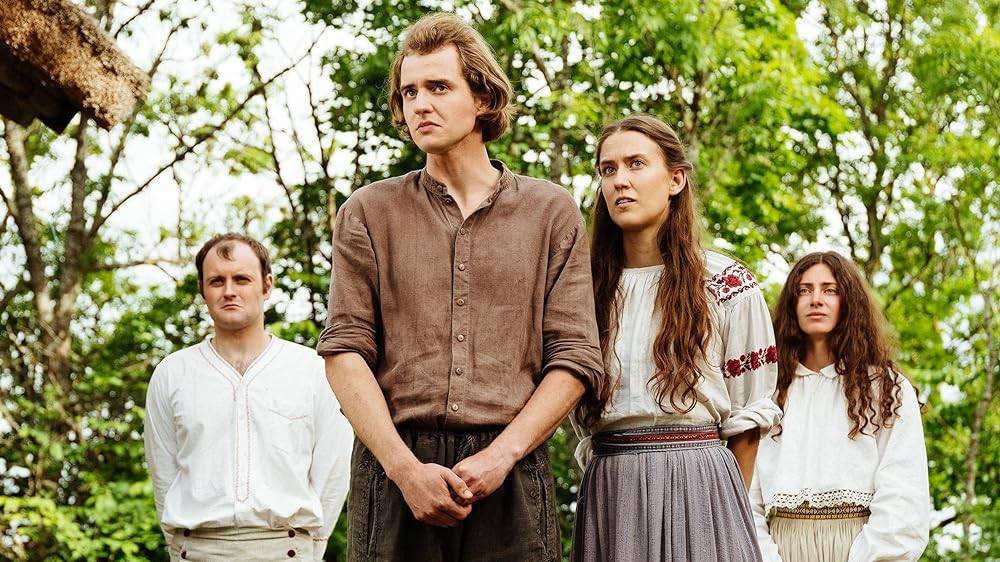The Boston Baltic Film Festival runs in-person from 3/1 through 3/3 at the Emerson Paramount Center and will continue virtually through 3/18. Click here for the schedule and ticket info, and watch the site for Joshua Polanski’s continuing coverage!

Staņislavs Tokalovs must have been one of the Baltics’ busiest film creatives over the past few years because he has three separate entries in this year’s Boston Baltic Film Festival: the own family documentary Everything Will Be Alright; an eight-part mini-series Soviet Jeans; and Lovable, a classic small-scale social drama.
After Matiss’s (Kārlis Arnolds Avots, who also stars in Soviet Jeans) older girlfriend, Agate (Kristīne Krūze), unexpectedly dies in a freak accident, no one is left to care for Paula (Paula Labāne), her young daughter. Matiss can’t be trusted as a business or romantic partner. He is even fucking another, younger, woman (Elīna Vaska) as Paula dies, a coincidence that leaves a bruise on his own understanding of self. Agate’s death also presents an opportunity for Matiss’s less than ethical business practices to seep into his personal life and strike it rich by manipulating the will of his deceased lover. The emotional crux of Lovable begins with the question of whether or not his reluctant and awkward relationship with Paula can challenge the dishonesty that pervades the rest of his life.
I imagine Lovable is the sort of a film a certain kind of social worker would find much to appreciate in. Every interpersonal relationship tangles up in complex webs of social systems — and the navigation of these systems by Matiss, a real estate bailiff, reshapes how he looks and responds to those around him. From business deals to the state’s management of wills, the functions of life under a capitalist state define and nourish (or poison) the social lives of individuals.
The highlight of Lovable is undoubtedly Avots’ lead performance. He gives my favorite performance of his yet and, considering his work in January, that’s a feat worth voicing. He strikes me as one of the rising young talents of the Latvian industry and he should have a bright future before him. Matiss’s lack of an easily readable response to Agate’s death could be interpreted as stoicism, but Avots’ subtlety opens up another interpretation, one located from the silence of mourning — an emotional place that all who have mourned know well. (And the minimal score corroborates his silent mourning.) A lesser actor would only leave room for stoicism.
Both rendezvouses with his illicit lover (Vaska, whose only two appearances are in sex scenes) end in dissatisfaction. The world outside of their intercourse refuses to be put aside and distracts or directly disrupts their lovemaking. Tokalovs and cinematographer Oleg Mutu make the sex itself a bit sticky, quite sweaty, and a little messy — as if the sex requires a respectable amount of effort, though the hard labor doesn’t pay off (much like the day job of Matiss or the life plans of Agate). The work of sex appears more important than the satisfaction. The first affair ends with a disappointed lover asking for Matiss to fetch her a morning after pill; in a capitalistic exchange, he gives her money instead — a poor faith gesture that rues the mood and reduces her to a sexual object instead of a lover. She responds with a sourful bite by reminding Matiss of his girlfriend. The second time is interrupted by Paula’s babysitter who was hired by the now deceased Agate, and, as such, serves as a reminder of his departed partner and internalized guilt. That both end negatively is less of a comment about the sexual lives of the characters than a denial of a marketplace version of a romantic relationship. The “exchange” doesn’t work in the bedroom. And for Matiss, the selflessness of real capitalism — with a crooked business deal gone wrong — shows the capacity to ruin his life.

A romantic comedy set in Lääne County, Estonia sometime during the beginning of the 20th century, Faulty Brides is the lightest film I saw at the 2024 Boston Baltic Film Festival. Projecting as a palatable four-quadrant and family-friendly picture, director Ergo Kuld’s latest film goes down easy and, with one major caveat, it’s quite enjoyable. The caveat: a strong, core level insensitivity to the disabled community. To enjoy this film, which I do think is possible, requires the same admission of fault and reflection as would something like the incredibly racist Rush Hour movies.
Two sisters at the Lipuvere farm — Leena (Maarja Johanna Mägi, who also features in the Melchior films) and Miina (Maria Teresa Kalmet) — find themselves being used as collateral in their father’s financial planning and he arranges for them to be married to his brother’s two sons (a couple of imbeciles from Mulgimaa, the opposite corner of the country). They each have local lovers of their own and would prefer to see those out than to marry their cousins that they have never met. Leena and Juhan (Simo Andre Kadastu), the miller’s son, glow and get giddy at the sight of one another, while Miina and Joosep (Oskar Seeman), a servant on the family farm, can’t keep their hands off each other and can’t stop making plans for the future.
When the cousins visit, the four haphazardly concoct a plan to deter the suitors — a plan that, to chagrin, includes a lengthy bit that insists the sisters (or their lovers dressed up as women pretending to be the sisters) have a laundry list of disabilities — a fact meant to put off their cousins. And it likely would have in the 20th-century countryside, but the historicity is a non-issue. If one reads the title through the masculine imitation of the sisters then perhaps some goodwill can be extended; if one wants to be even less generous, the title — a quote from a joke told by one of the male lovers — can instead be read through disability. Their disability makes them faulty. Yuck.
Kuld wastes no time and moves with great economy from inciting event to incoming danger to stressful encounter as the four lovers try to sabotage the arranged marriages. The recurring cowpie joke signals the sort of family-friendly humor the filmmakers aim for, as does the splendid cooking scene. Juhan and Joosep, disguised as Leena and Miina, cook a purposefully disgusting meal for cousins Enn (Kaspar Velberg) and Jaak (Pääru Oja). The meal includes fly infested milk, whole fish dropped in charcoal, and a few other lovely surprises. The source of the humor is harmless — anyone can be a bad cook! — and it’s laid on the target (the brothers) with such ease and adroitness that with some bickering and bantering between the “sisters” the scene earned several good chuckles from me. The cow poop, less so. But hey, that’s the point of the family-friendly approach: if there’s a little something for everybody, that also means not everything will be for everybody.
And the disability stuff wasn’t for me. Though I’m not disabled myself, I do have disabled family, and that primes me to be a bit sensitive to this sort of thing. I’m sure the insensitivity carries over from its 1888 source material from Eduard Vilde, though that does more to explain the issue than it does to excuse it. The issue is that so much of the film’s comedic attraction comes from the tug and pull of this dynamic. Seeman and Kadastu get the brunt here, carrying on the disabled performance in front of the cousins like an SNL skit that just overstays its welcome. Mägi and Kalmet also theatrically and exaggeratedly entertain disability, including with some lazy eye and strange tongue movements, but not for long because of the way their conniving works out. (The sisters are too pretty and they need their man-women to scare off the out-of-town suitors.) When the four are together and aren’t putting on a show for Enn and Jaak, the actors bounce well off each other’s energy and strengths. Most of the characters have their own sub-category of comedy to appeal to and that works great when the substance holding a joke together isn’t the idea that disability makes someone inferior.
I was reminded several times by Mägi’s over-the-top commitment — one of her great traits as an actor — of Sammo Hung. Like Sammo, one of the greatest to ever do it, Mägi commits with no abandon and leaves nothing left to her characters. She’s all in all the time and that makes her always a pleasure to watch. They happen to share a background in the theater where overperformance creates an easy access point to empathy (and also helps, practically speaking, to assure everyone in the room can understand a character’s feelings). Sammo’s dedication once realized itself in Heart of Dragon, alongside his longtime artistic partner Jackie Chan, in a fully distasteful role as a mentally challenged adult. What made Sammo great in Wheels on Meals or The Millionaires’ Express highlighted the issues with his performance in Heart of Dragon and further ostracizes the disabled community. The same happens in Faulty Brides with Mägi, an actor who has quickly become a welcome face for me in Estonian film and one that I think deserves a larger stage. Hopefully the next stage is a bit more inclusive.
Faulty Brides
2022
dir. Ergo Kuld
75 min.
Lovable
2022
dir. Staņislavs Tokalovs
113 min.
Both films are available online from March 4-18.
Joshua Polanski is a freelance film and culture writer who writes regularly for the Boston Hassle and In Review Online, and has contributed to the Bay Area Reporter, and Off Screen amongst other places. His interests include the technical elements of filmmaking & exhibition, slow & digital cinemas, cinematic sexuality, as well as Eastern and Northern European, East Asian, & Middle Eastern film.

